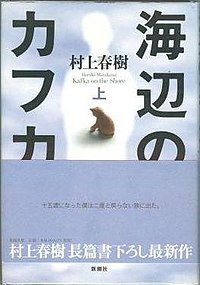
The second precious present from the feestdagen was actually a Christmas present from Carla: Haruki Murakami's 2002 novel, 海辺のカフカ or Umibe no Kafuka (Tranlated to English as: Kafka on the Shore, although a direct translation, 'Kafka's Coast', should be as appropriate).
Wiki notes that John Updike described this novel as a "real page-turner, as well as an insistently metaphysical mind-bender." I agree, I started it just because it was nearby when sitting in Carla's living room in Brabant, and since then I have been struggling to let myself concentrate on work. Hopeless... So I submit myself to this novel before I go back to work. I also find the book much less unsettling than Murakami's previous novel I read, 世界の終りとハードボイルド・ワンダーランド (Hard-Boiled Wonderland and the End of the World).
The plot (as Wiki supplied) is as follows, although it doesn't do justice to the style:
The style is amazing (and amazingly Murakami, if I may say so after reading only two of his novels... Well... Wiki agrees that it is his typical blend):Comprising two distinct but interrelated plots, the narrative runs back and forth between the two, taking up each plotline in alternating chapters.
The odd chapters tell the 15 year old Kafka's story as he runs away from his father's house to escape an Oedipal curse and to embark upon a quest to find his mother and sister. After a series of adventures, he finds shelter in a quiet, private library in Takamatsu, run by the distant and aloof Miss Saeki and the androgynous Oshima. There he spends his days reading the unabridged Richard Francis Burton translation of A Thousand and One Nights and the collected works of Natsume Sōseki until the police begin inquiring after him in connection with a brutal murder.
The even chapters tell Nakata's story. Due to his uncanny abilities, he has found part-time work in his old age as a finder of lost cats. The case of one particular lost cat puts him on a path that ultimately takes him far away from his home, ending up on the road for the first time in his life. He befriends a truck-driver named Hoshino. Hoshino takes him on as a passenger in his truck and soon becomes very attached to the old man.
Nakata and Kafka are on a collision course throughout the novel, but their convergence takes place as much on a metaphysical plane as it does in reality and, in fact, that can be said of the novel itself. Due to the Oedipal theme running through much of the novel, Kafka on the Shore has been called a modern Greek tragedy.
Kafka on the Shore demonstrates Murakami's typical blend of popular culture, quotidian detail, magical realism, suspense, humor, an involved and at times confusing plot, and potent sexuality.Murakami also has a magnificient website, which I suggest you visit after first getting to know his world/work a little. (If you already do, click right here...)
No comments:
Post a Comment